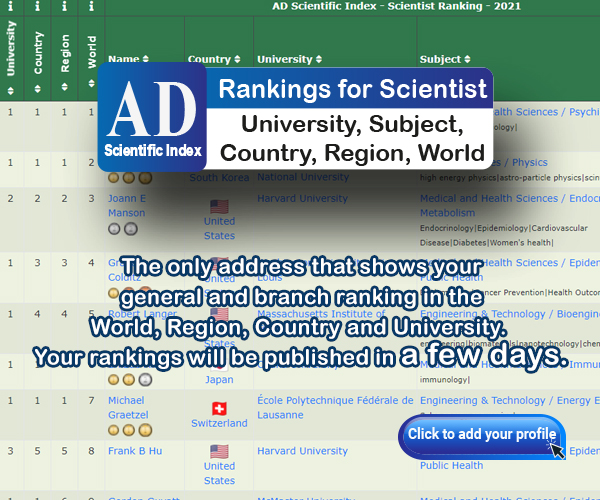Productivity Rankings
Productivity Rankings is a unique service offered only by “AD Scientific Index”. This is a ranking system derived from the i10
index in order to show the productivity of the scientist in publishing scientific articles of value. Productivity Rankings is an instrument
that lists productive scientists in a given area, discipline, university, and country and can guide the development of meaningful
incentives and academic policies. The world rankings, regional rankings, and university rankings of scientists in this table are
developed based on the total i10 index.
Academic collaboration
Scientific fields of interest specified in the profiles of scientists are available for other scientists from different countries and
institutions to enable academic collaboration.
Ranking Criteria for Top Universities:
In the presence of many different university ranking systems, as the “AD Scientific Index”, we have developed a ranking
system with a different methodology based on the principle of including only meritorious scientists. Based on Google Scholar’s total
h-index scores, we have listed all academicians, who are ranked in the world in the top 10,000 and top 100,000 in university rankings.
Furthermore, we have listed the breakdown of this ranking by main subjects. As the order of ranking principles, we used the overall
top 10,000 scientists list primarily. Secondly and thirdly, we used the ranking in the top 100,000 and top 200.000 scientists list.
Fourthly, the total number of scientists in the AD Scientific Index was ranked by the university. In the case of equalities within a
university ranking, we used the highest rank of the scientist in the respective university as it is listed in the world ranking.
You may sort the ranking from the highest score to the lowest or vice versa in any of these fields. You can observe the fields,
which move the respective university to the forefront. Furthermore, the name of the academician with the highest total h-index in
the respective university is displayed with the world ranking. Top University Ranking by “AD Scientific Index” will not only list the
areas, where a university is the best or has room for improvement, but also reflect the outcomes of scientist policies of the institutions.
This report reveals the competency of institutions to attract prized scientists and the ability of institutions to encourage advances and
retain scientists.
Ranking Criteria for Countries:
As described in the university ranking section, it is not easy to obtain and standardize data from about 13,600 universities for
the country ranking. Therefore, we based our ranking system on the number of meritorious scientists. Four criteria are used to rank
the countries. The first one is the number of scientists in the top 10,000 list. The second and third criterion are the number of
scientists in the top 100,000 and top 200.000 list. The fourth one is the number of scientists listed in the AD Scientific Index. In the
case of equalities after applying all these four criteria, the world rank of the meritorious scientist of that country is used.
World Top 100 Scientists 2021
The ranking of “Top 100” scientists is based on total h-index scores. Top 100 scientists can be ranked globally or specific to
the following regions including Africa, Asia, Europe, North America, South America, Oceania, Arab League, EECA, BRICS, Latin
America, and COMESA based on total h-index scores without any breakdown by subject areas. Top 100 rankings in the world, in a
continent, or a region include standardized subjects areas of Agriculture & Forestry, Arts, Design and Architecture, Business &
Management, Economics & Econometrics, Education, Engineering & Technology, History, Philosophy, Theology, Law/Law and Legal
Studies, Medical and Health Sciences, Natural Sciences, and Social Sciences. Subjects indicated as “others” will not be included
in the ranking by regions and subjects. Therefore, you may wish to specify your subject and branch and contribute in order to
standardize your performance. Determining the subjects/departments, to which scientific fields would belong, may seem easy in
some branches and in a variety of countries. However, it may create considerable confusion in some other countries, regions, and
schools. We would like to emphasize that the following fields including Engineering, Natural and Environmental Sciences, Biology,
Biochemistry, Material Science, Biotechnology, Chemistry, and Social Sciences may exist in quite variable spectrums in different
countries. Therefore, we would like to stress that the standardization of subjects and branches has not been easy. To perform
standardizations, we accepted the official names of the institutions and academic branches as accurate in the way that they were
specified on the university website. We have developed this strategy in order to standardize this complex situation at least partially.
Furthermore, we started a procedure to add an asterisk as “*” at the end of the names of the authors when a scientific paper of
interest included many authors such as CERN’s scientific papers.
Limitations of the “AD Scientific Index”: Missing or Inaccurate Profiles or Missing Institution Names
This index is a comparative platform developed by ranking accessible and verified profiles. First and foremost, not being
included in this index for various reasons does not indicate that the academician is not prized or it does not mean that only those
academicians listed in the index are the prized ones. This needs to be carefully noted. A meritorious scientist may not have been
included in this index because of not having a Google Scholar profile or our lack of access to that profile for various reasons. The
unavailability of verified Google Scholar profiles of scientists, who work in well-known and respected academic institutions in
respective countries, may prevent us from finding institutions and scientist profiles. Because updating the profiles in the system and
collection of data from open sources require efforts and because the data have been collected for the first time, it is not possible for
the index to be completely free of errors. Accurate and instant updating of profiles and institution names requires an endless workload
that no institution can overcome only with available resources despite all endeavors.
A high h-index (WOS, Scopus, Publon, etc.) does not mean that a profile will be automatically created for the academician in
Google Scholar. Indeed, Google Scholar profiles are created and made public by scientists themselves on a voluntary basis. An
individual may not have created a profile for various reasons and, therefore, will not be listed in the “AD Scientific Index”.
Furthermore, a profile can be rejected or may not be listed at a particular time. It needs to be considered that, at the time of our
search, a profile may not exist or may not be public, some profiles may be public only at particular times, the information in the
profile may not be standard, there may be more than one profile belonging to the same person, the profiles may not be verified, the
name of the institution can be missing, surnames or institution names can change, profile owners may have died, or known or
unforeseen problems may happen. However, missing information is completed in the system regularly and the list is updated and
corrected continuously. Profiles; whose owners have passed away, are removed from the system.
When we detect or be informed of unethical situations in profile information that go beyond the limits of goodwill, the person
is excluded from the list. You can report problematic and misleading profiles on our “Rejection List” page. As individuals are
responsible for the accuracy of their profiles, organizations, too, should include the need for reviewing academic staff profiles in the
agenda.
Articles with thousands of authors such as CERN studies in the field of physics or scientific studies with more than one author in
classification studies in medicine or statistical studies raise debates about the requirements for the amount of the article content belonging
to one author. Because such papers may cause inequality of opportunity, a separate grouping system may be needed in the future.
Pros and cons of “ranking” systems including Web of Science, Scopus, Google Scholar, and similar others are well known and the
limits of use of such systems have long been recognized in the scientific community. Therefore, interpreting this study beyond these limits
may lead to incorrect results. The “AD Scientific Index” needs to be evaluated considering all of the abovementioned potential limitations.
South America Top 10.000 Scientists AD Scientific Index
RELATED ARTICLES





